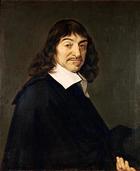
(La Haye, France, 1596 - Stockholm, Sweden, 1650) French philosopher and mathematician. René Descartes was educated at the Jesuit college of La Flèche (1604-1612), where he enjoyed some favorable treatment in view of his poor health.
He earned a bachelor's degree and law degree from the Faculty of Poitiers (1616), and twenty-two left for the Netherlands, where he served as a soldier in the army of Maurice of Nassau. In 1619 he enlisted in the ranks of the Duke of Bavaria; November 10, during three successive dreams, experienced the famous René Descartes 'revelation' that led to the development of his method.
After giving up the military life, Descartes traveled through Germany and the Netherlands and returned to France in 1622, to sell their possessions and thus ensure an independent life; spent time in Italy (1623-1625) and then settled in Paris, where he became involved with most scientists of the time. In 1628 he decided to settle in the Netherlands considered more favorable place to meet philosophical and scientific objectives that had been set, and resided there until 1649.
The first five years were devoted mainly to develop its own system in the world and its conception of man and the human body, which was nearing completion in 1633 when, on hearing of the condemnation of Galileo, resigned from the publication of his work which would place posthumously.
In 1637 he published his famous Discourse on Method, presented as a prologue to three scientific experiments. Descartes proposed a methodical doubt sometiese opinion that all knowledge of the time, though, unlike the skeptics, his was a question aimed at finding ultimate principles on which solidly cement the knowledge.
This principle is found in the existence of consciousness itself that doubt in his famous formulation "I think, therefore I am." Based on this early evidence, could partly retrace the path of skepticism, finding in God the ultimate guarantor of the truth of the evidence of reason, which manifest as "clear and distinct" ideas.
The Cartesian method, which Descartes suggested for all sciences and disciplines, is to break down complex problems into simpler parts to gradually find its basic elements, the simple ideas that are presented to the right of an obvious way, and proceed from of them, by synthesis, rebuild the entire complex, requiring each new relationship established between simple ideas the same evidence thereof.
Scientists trials followed, offering a compendium of physical theories, among which his formulation of the law of inertia and a specification of the method of mathematics. The foundations of his mechanistic physics, which was the principal extension property of material bodies, placed them in metaphysics that exposed in 1641, where his well enunciated same proof of the existence and perfection of God and the immortality of the soul . The radical mechanism of physical theories of Descartes, however, determined that they were overcome later.
Soon his philosophy became known and started to become famous, which he led to threats of religious persecution by some academic and ecclesiastical authorities, both in the Netherlands and France. In 1649 he accepted the invitation of Queen Christina of Sweden and moved to Stockholm, where he died five months after his arrival of pneumonia.
Descartes is considered the originator of modern rationalist philosophy for its approach and solve the problem of finding a foundation of knowledge to ensure the certainty of it, and as the philosopher who was the point of definitive break with scholasticism.







